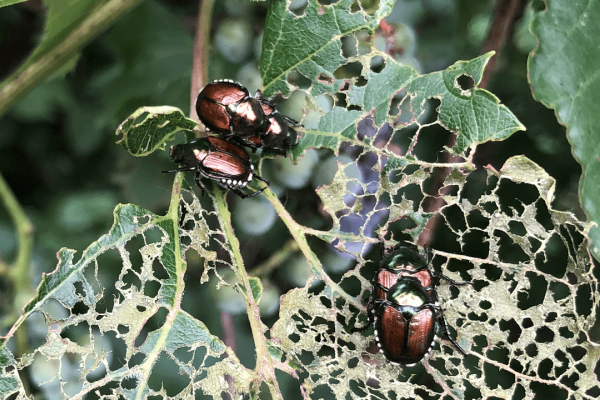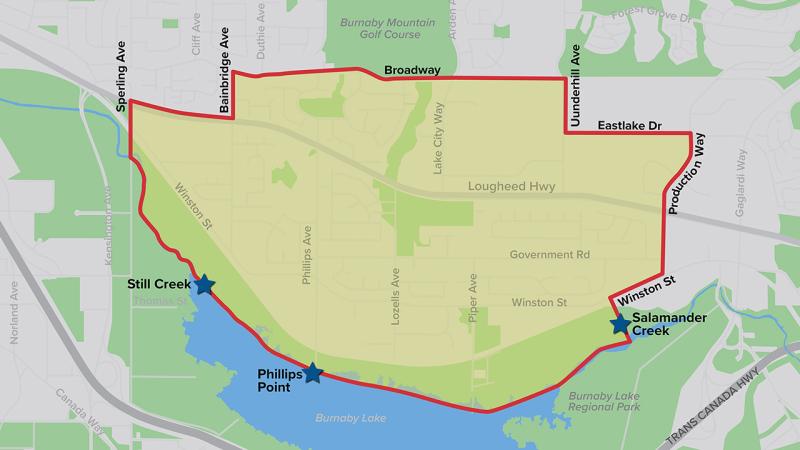
Japanese Beetle

What are Japanese beetles?
Japanese beetles are an invasive plant pest that pose a serious threat to our environment. Adult beetles eat the flowers, foliage and fruit of more than 300 plant species, including elm, maple, apple, apricot, cherry, rose, blueberries, grapes and more. Their larvae feed on the roots of lawns and other plants.
The City is working with a number of agencies and municipalities to take proactive and preventative measures.
Regulated area
To prevent the spread of Japanese beetles in Burnaby, the Canadian Food Inspection Agency (CFIA) has established a regulated area where Japanese beetles have been detected. The boundaries of the regulated area are up to date.
If your address falls within the regulated area, restrictions are in place to move regulated articles outside of the regulated area.
Regulated articles
The movement of plants with soil or soil-related matter attached out of the regulated area is restricted year-round. Soil alone and above-ground plant parts are no longer regulated. Residents in the regulated area should keep yard waste on-site, or use their green bin to dispose of it.
If plants with soil or soil-related matter attached must be removed from your property and taken outside of the regulated area, residents or landscapers moving these materials must have a movement certificate issued by the CFIA. Residents or landscapers will be asked to present the movement certificate at the City's Eco-centre before tipping their yard waste. The City's Eco-centre is the only approved facility in Burnaby to receive materials from the regulated area. For more information about movement certificates, or to request a site assessment by the CFIA, visit inspection.canada.ca/JB.
Before taking plants with soil or soil-related matter attached out of the regulated area to the Burnaby Eco-Centre, make sure to:
- have a valid CFIA-issued movement certificate to present at the Eco-Centre
- secure the load with a tarp or in a covered transport
- travel directly to the Burnaby Eco-Centre located at 4855 Still Creek Drive
*We encourage you to remove as much soil as possible and detach the root ball from above-ground plant material before you take it to the Eco-Centre.
What is the City doing?
The City is working with federal, provincial and other municipal governments, as well as industry and non-governmental stakeholders to support the control of this potentially destructive pest. Each spring, we treat our public lands and parks to help control the spread of the beetle. This includes turf areas along boulevards and medians, and larger turf areas in affected parks. In 2025, treatments are scheduled for:
- Government Road neighbourhood boulevards: May 5-9 (view map)
- Central Park – Kingsway: May 12
- Swangard Stadium: May 13
- Warner Loat Park: May 13 (park closed during treatment)
- Charles Rummel Park South: May 14
- Charles Rummel Park North: May 15
- Irmin Street and Royal Oak Avenue green spaces: May 16 and 20 (view map)
Private property treatment
To help with the collaborative effort to eradicate Japanese beetles, property owners are encouraged to treat private property through a certified pesticide applicator. Property owners in the treatment area will receive additional information in the mail. To find out more, contact your property management company or a landscaping company working in your area.
Questions and answers
- Report sightings of the Japanese beetle and/or feeding damages to the CFIA.
- Do not transport regulated articles out of the regulated area.
- Do not remove, relocate or interfere with Japanese beetle traps.
There are no changes to your green bin collection program. Material collected through the City’s residential and commercial green waste program is taken to a composting facility that is approved for plant material that may contain Japanese beetle.
You may notice the following feeding damage on your plants:
- lacy, skeletonized feeding damage on leaves
- large, irregularly shaped portions that have been chewed out on some flowers
If you think you have found an insect which you suspect is Japanese beetle, or if you have found signs of Japanese beetle feeding damage anywhere in BC, report your find(s) to the CFIA as soon as possible.
- oval-shaped when looked at from above
- approx. 10 mm long and 6 mm wide
- head and thorax are metallic green
- wing coverings are metallic copper-brown
- white tufts of hair along the sides and rear of the abdomen
If you think you have found an insect which you suspect is Japanese beetle, or if you have found signs of Japanese beetle feeding damage anywhere in BC, report your find(s) to the CFIA as soon as possible.
- Report all suspect beetles and feeding damage. If you find suspect beetles or feeding damage, report your find(s) to CFIA as soon as possible by calling 604-292-5742 or emailing [email protected].
- Learn about current movement restrictions and obtain a movement certificate from the CFIA. It is illegal to move plants with soil or soil-related matter attached outside of a Japanese beetle regulated area in BC without permission from the CFIA. Report all illegal movement of regulated materials to the CFIA.
- Compost. Composting plant waste on-site helps prevent the spread of both Japanese beetle adults and larvae.
- Use your green bin. Use your City of Burnaby municipal green bin to dispose of plant and soil material that cannot be stored on site.
- Shake it. If you must move any plants or green waste off site, shake plants to remove any soil and Japanese beetles prior to disposal or prior to loading it into your vehicle for transport to a disposal site.
- Tarp your load. If you must transport regulated material off site, tarp your load to prevent beetles from flying out.
- Thoroughly clean gardening and lawn care equipment regularly. Clean soil from all equipment and tools, including lawn mowers, aerating and power raking equipment, especially if you intend to use these items at another location or job site.
- Check your clothing, equipment and vehicles for hitchhikers. Japanese beetles can also hitch a ride on clothing, work boots and vehicles.
The larvicide used in treatment, Acelepryn, is not harmful to you, your pets, other animals, or other pollinators like bees and butterflies. It is sprayed directly on the soil and turf and targets root-eating grubs. Acelepryn is approved for use in Canada by the Pest Management Regulatory Agency of Health Canada and is permitted for under the City’s Pesticide Use Control Bylaw No. 13509, Section 4(f).
- Canadian Food Inspection Agency (CFIA)
- BC Ministry of Agriculture and Food (BCMAF)
- Invasive Species Council of BC (ISCBC)
- BC Landscape and Nursery Association (BCLNA)
- City of Burnaby
- City of Vancouver & Vancouver Board of Parks and Recreation
- City of Port Coquitlam
- Other governmental and non-governmental stakeholders
In 2023, changes have been put into place to focus Japanese beetle response efforts on addressing the number of beetles detected and the highest-risk pathway for the beetle to spread. Federal regulations were updated to include,
- an expanded regulated area in Burnaby and Vancouver
- a new regulated area in Coquitlam/Port Coquitlam
- updated regulated article to only restrict the removal of plants with soil or soil-related matter attached from a Japanese beetle regulated area
